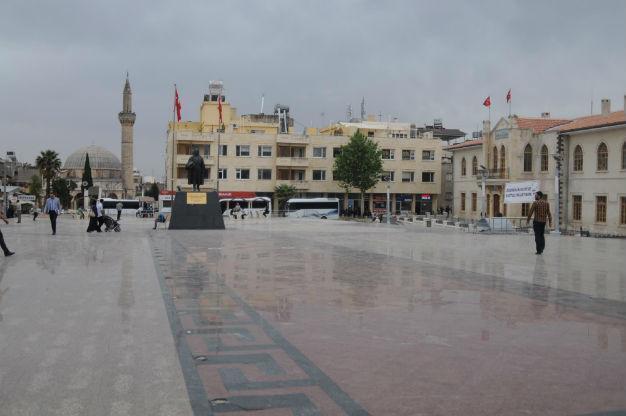Residents flee Turkey’s Kilis as ISIL rockets continue to hit border province
İdris Emen – KİLİS

DHA photo
Local residents and Syrian refugees have begun fleeing the southeastern province of Kilis in Turkey, as a wave of fear eclipsed the border town amid persistent rocket firings from Islamic State of Iraq and the Levant (ISIL)-held territories across the border. A total of 18 civilians have been killed by ISIL rockets since January.
Syrian refugees are the largest group of civilians currently fleeing Turkey’s second smallest province, which hosts around 116,000 Syrians despite its population of only 106,000.
“We launched businesses here and started to look after our families,” a member of a Syrian family that has been living in Kilis for the past three years said, adding they will be moving to neighboring Gaziantep province, following in the footsteps of “many Syrian families.”
Students and civil servants are among other leading groups leaving town, as around 600 teachers have been asked to be reassigned from the province, according to Osman Boybeyi, the chief of the Eğitim-Sen education union in Kilis.
Main opposition Republican People’s Party (CHP) Hatay deputy Birol Ertem also supported the claims, saying some 15 medical personnel have resigned from their posts so far due to fear for their safety.
“I had to leave the city thrice due to rockets [that had hit Kilis]. Our families do not want us to go to school. I will not take the exams and go to Gaziantep instead,” university student Arzu Aslan explained, while a civil servant said he will ask to be appointed elsewhere. “I already sent my wife and kids to my hometown because of the rockets,” he added.
A resident from the Demirciler neighborhood, which was previously hit by an ISIL rocket, said only four families remained in the street that recently was home to around 30 families.
“My daughter-in-law took the kids and moved to [the Aegean province of] İzmir. My brother-in-law went to [the southern province of] Adana,” she said, adding she had also started preparing for a permanent journey to Istanbul.
An interprovincial bus driver said he had not been working for the past month due to the small number of passenger but, for the past week, he has been making two journeys per day. He claimed some 500 people leave the province daily.
Ertem said the CHP would bring the wave of migration from Kilis to parliament’s attention.
According to recent claims by the head of the province’s real estate agents’ association, İsmail Cem Eryılmaz, some 30 percent of the population has already migrated to neighboring provinces. The real estate market also saw a significant drop, as prices fell by 35 percent, he alleged.
Locals have also emptied from the usually lively streets and markets because of the rockets, which began falling on Jan.18.
Shops have been mostly closed as people prefer to stay in their homes.
“Going out on the streets is a huge risk. We will leave as soon as we buy everything we need,” a local shopping in a market said.
Hit by up to 45 Katyusha projectiles in several firings from Syria, classes in Kilis were closed while around 90 percent of students have stopped going to school.
Meanwhile, a child who was heavily wounded in last week’s rocket strike succumbed to his wounds on April 27, increasing the death toll to 18 in similar incidents since January.
Muhammed Idlisa, a 14-year-old Syrian, succumbed to his injuries in an intensive care unit.
Katyusha rockets fired from an ISIL-controlled region in northern Syria hit Kilis on April 22, killing three people.
Eleven Turkish citizens and seven Syrian have been killed in rocket attacks since Jan. 18 in the province.
Recently, two Katyushas fired from Syria hit a mosque just 100 meters from the Kilis Governor’s Office on April 24. Two people were killed in the incident.
